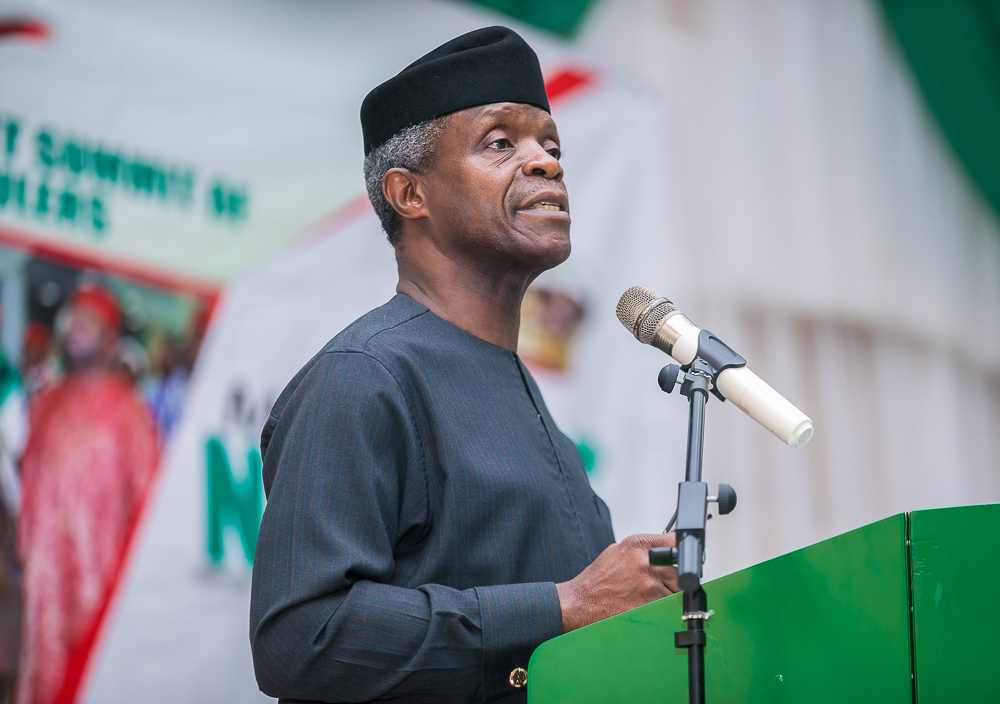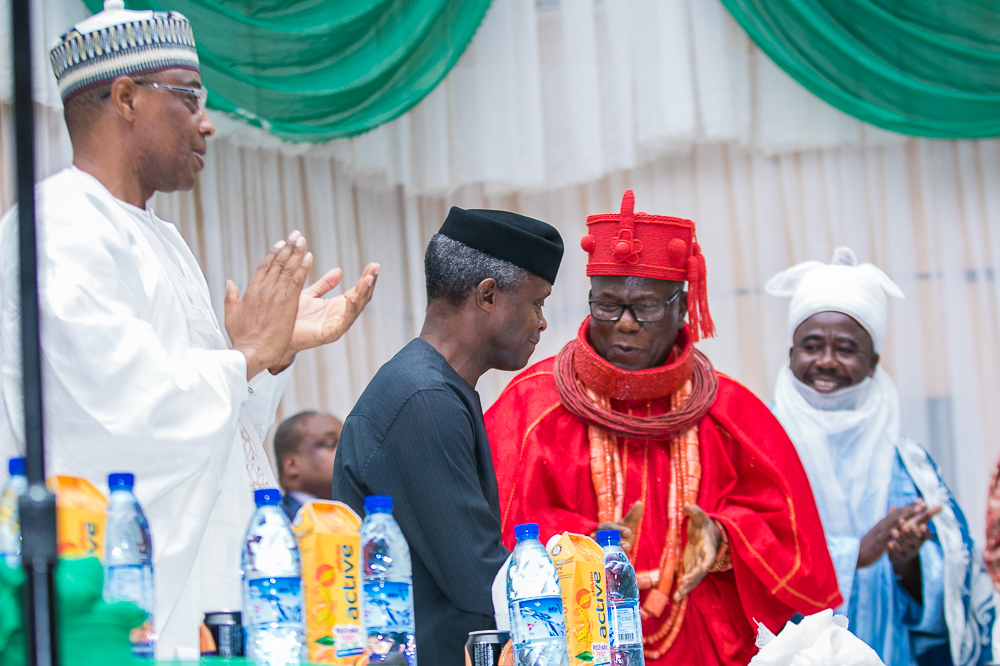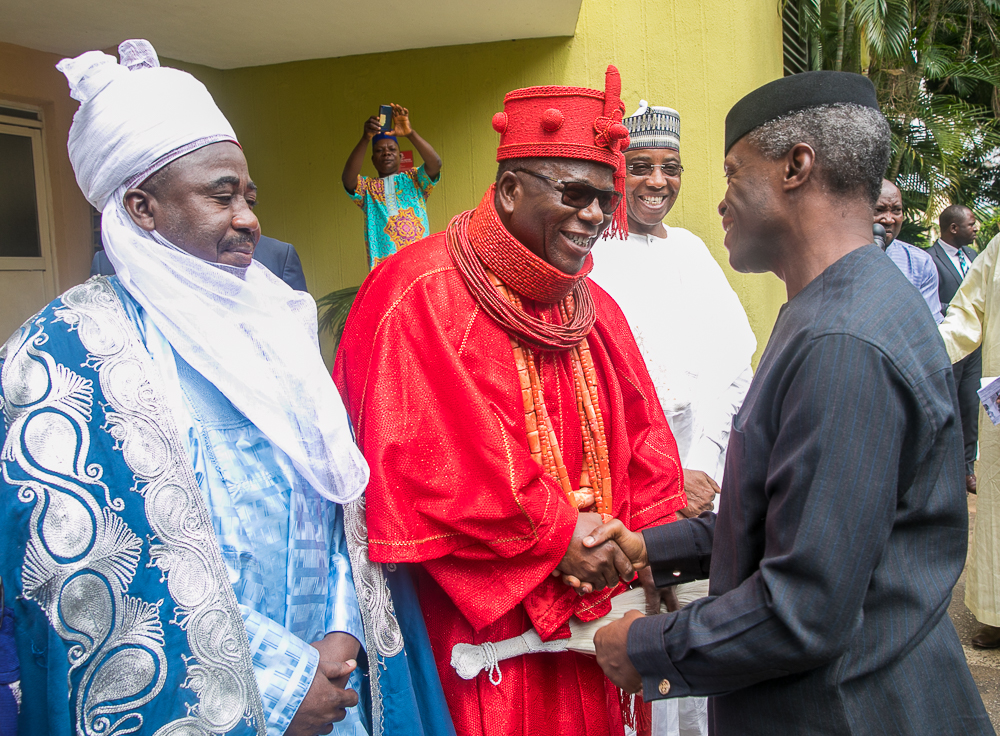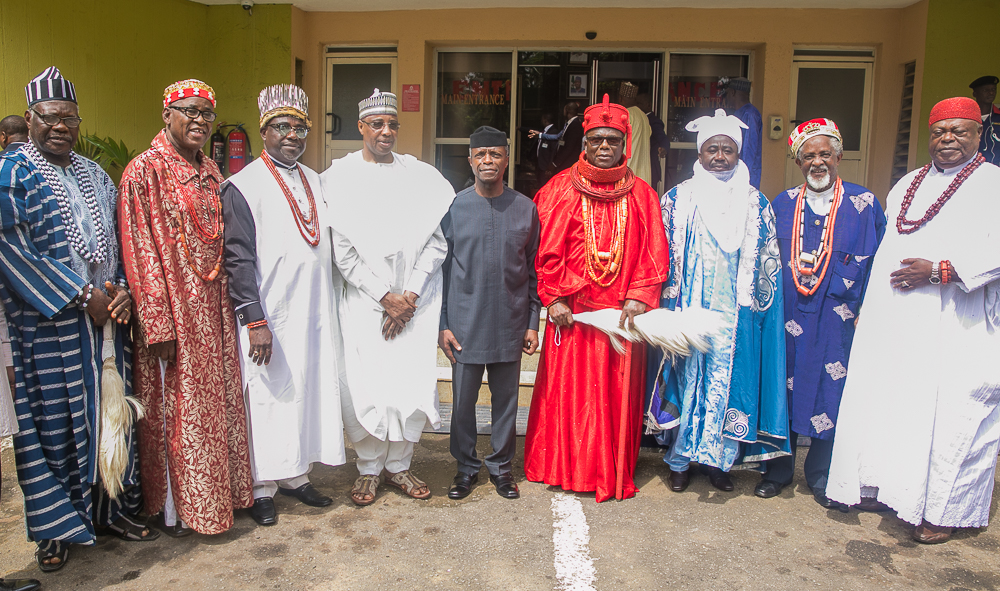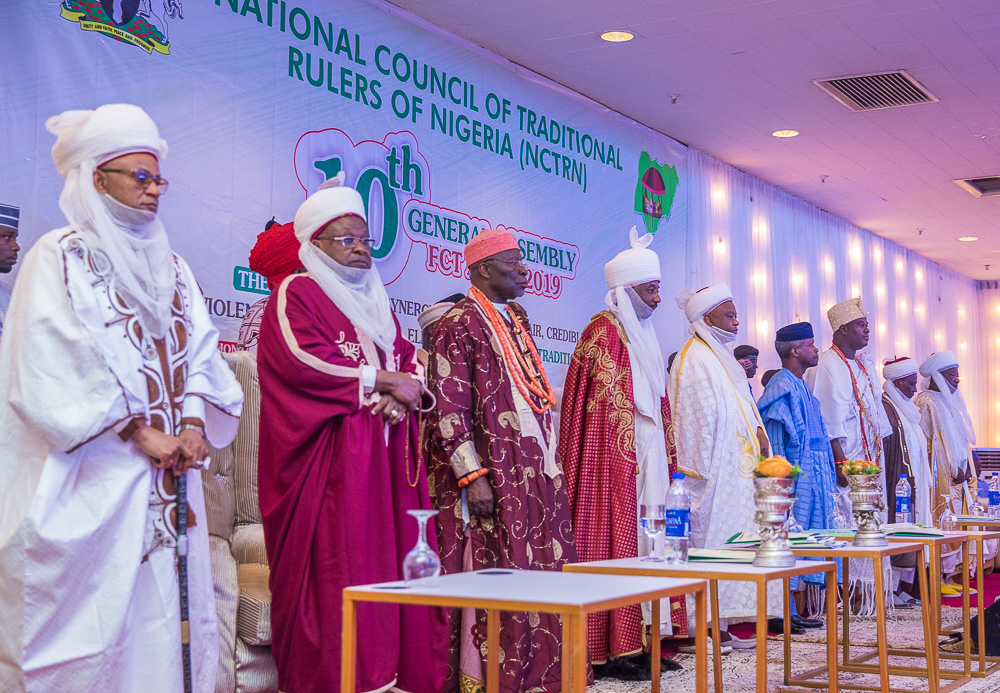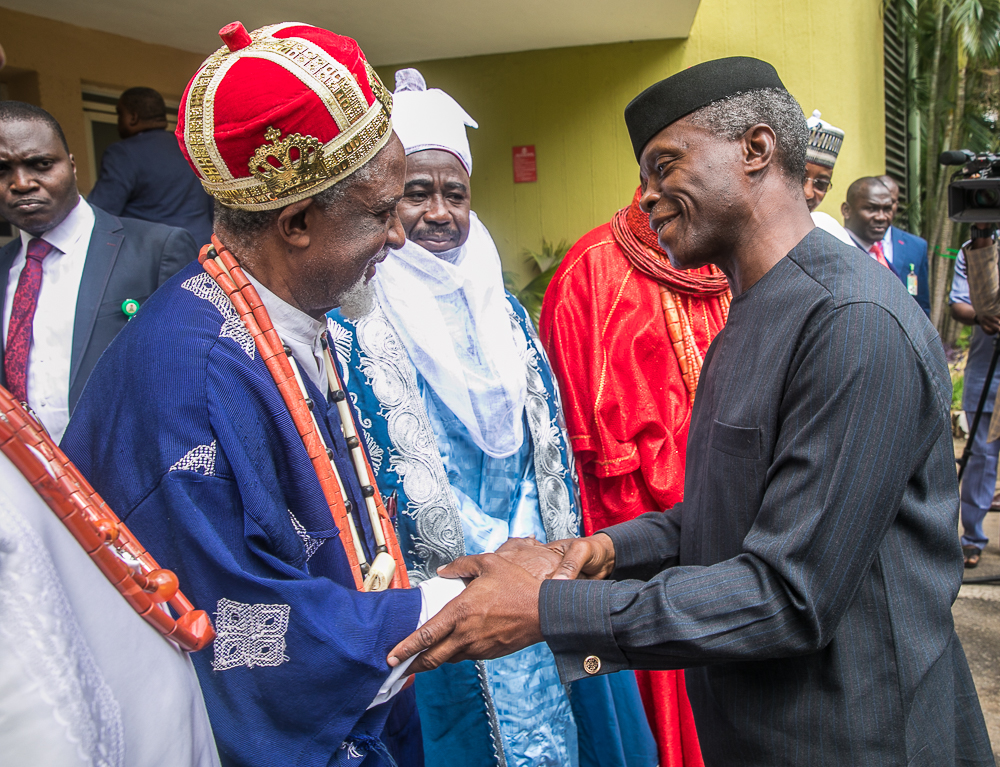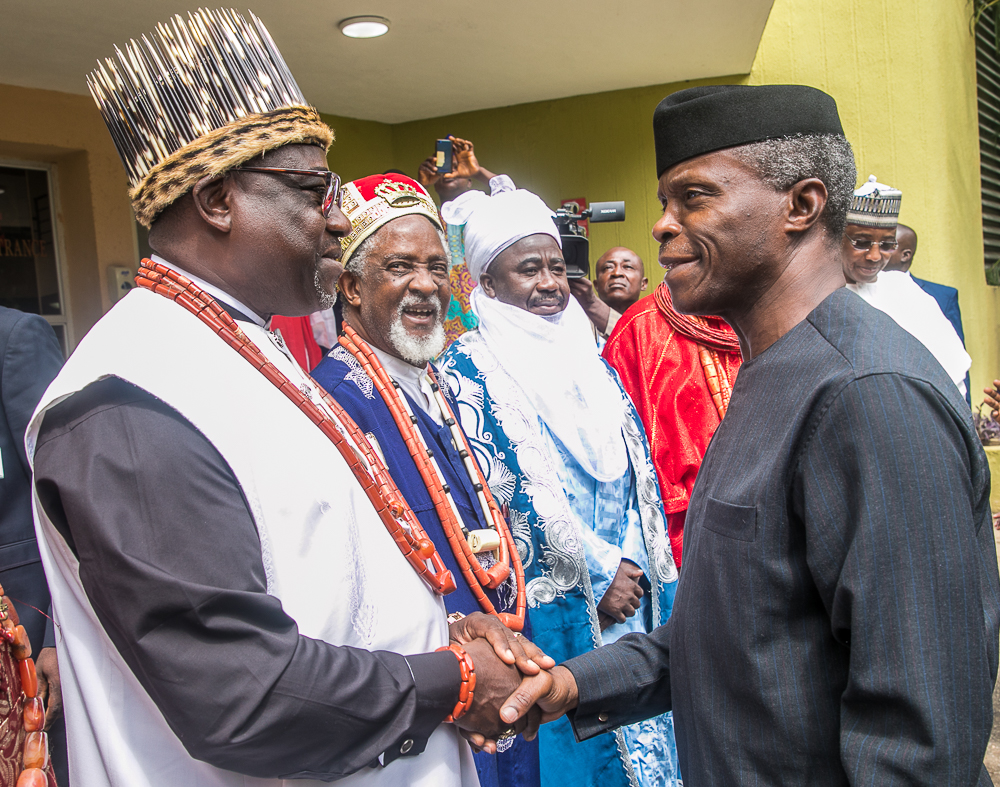10th National Development Summit Of Traditional Rulers, Themed: Make Nigeria Great Again
SPEECH BY HIS EXCELLENCY, PROF. YEMI OSINBAJO, SAN, GCON, VICE PRESIDENT, FEDERAL REPUBLIC OF NIGERIA, AT THE 10TH NATIONAL DEVELOPMENT SUMMIT OF TRADITIONAL RULERS, THEMED: MAKE NIGERIA GREAT AGAIN, IN ABUJA, ON WEDNESDAY, 18TH OF JULY, 2018.
PROTOCOLS
I am delighted to be here at the 10th Anniversary of this important gathering of the Royal Fathers of our Nation, the National Development Summit of Traditional Rulers in Nigeria. I bring you special greetings from President Muhammadu Buhari, on whose behalf I am here today.
The theme of this summit “Making Nigeria Great Again”, is both inspirational and rhetorical. It reminds us of the great hopes and deeds of our heroes past and challenges us to make more phenomenal achievements.
It argues against complacency or living on past glories. It tells us, as President Barack Obama once said, that “we should be suspicious of those who keep talking about the good old days. For one thing, they usually have no ideas for the future”.
But the theme challenges us to ask the question, what will it take to make Nigeria truly great, and what should be the role of our traditional institutions and our royal fathers?
Let me say that the traditional monarchical institutions and their agencies, of which your royal highnesses are heads are the custodians of the great values and moral norms of our societies.
The traditions of any people are its foundations, the pillars and ramparts upon which it stands or falls. So traditions go beyond festivals, the rites of obeisance and the genuflections of loyal subjects; these are important, but they are not existential.
What is existential is whether the institutions can, by exemplifying high values and morals, raise the capacity of the people for high thought, integrity and right doing.
In other words, whether our royal institutions can project the highest traditions of our people and by so doing, encourage the establishment of a good society, an orderly society.
What are these basic principles? One is demonstrable hard work and diligence, as the only qualification for honour or reward.
Two, the principles of personal and corporate integrity; an abhorrence of corruption as it destroys and privatizes the Commonwealth and impoverishes the people we serve.
Three, respect for laws and duly constituted authority. Every authority or power must protect and preserve these principles. This is how those in authority determine the type of society that they preside over.
The question for our nation is: what are the moral values and principles that we base this great society that we are building? It is our traditional rulers who are custodians of our highest values and morals.
Of great moment also is the primary role of government in the maintenance of peace and security. We have seen remarkable improvements in the Northeast and also in the Niger Delta, and are now determined to replicate that in the North Central, where, as you all know, the country has had to deal with escalating tensions between farmers and herdsmen, in at least the last one and half decades.
Security no doubt affects every one of us. It affects the quality of governance; it affects the economy and affects the quality of our social life. One of the many tragic dimensions of the insurgency in the North East was the displacement of Emirs from their Palaces; the fact that not even the sanctity and symbolism of the traditional institution was spared or respected.
Looking back, it is easy to see why Boko Haram viewed the sacking of Palaces as an important duty; they were in competition for the authority and respect that Traditional Rulers embodied and commanded across the Northeast.
In a similar manner, one of the most powerful symbols of the gradual dawning of peace in many troubled communities was the news of Emirs returning to their Palaces, in preparation for the return of their subjects and the rebuilding of their broken communities.
It is clear that Nigeria’s greatness will only truly emerge in an atmosphere of peace and security. And for this peace and security to be guaranteed, we must, as governments, constitutionally mandated to protect the lives and property of Nigerians, deepen our cooperation with and dependence on traditional rulers across the country.
A great deal of emphasis is often placed on the role of law enforcement – the military, the police, intelligence agencies, in maintaining peace and security, and that is rightly so. They are critical elements in deterring criminality and ensuring that perpetrators are brought to justice. But if in our focus on law enforcement, we overlook the place of non-coercive conflict prevention and resolution mechanisms, we are doing ourselves and the people of Nigeria a great disservice.
Dialogue and engagement are just as important as law enforcement, especially in situations triggered by misunderstandings and disagreements between people and communities, who have existed peacefully side-by-side for centuries.
In that capacity, your royal highnesses have always played a crucial role. First, as the effective authorities at the local level and I say effective in the sense not just in the jury and participation in the sharing of authority, power and the jury, but de facto by virtue of the fact that our communities look up to and revere the traditional institutions.
In that capacity, none is better placed than our royal institutions to champion this vision of continuing dialogue and engagement because of the respect you command from the widest possible range of stakeholders and parties across the country.
You are also repositories of important intelligence that can be useful in detecting suspicious or criminal activity. The partnership between traditional authorities and government is therefore crucial for the survival of peace and security of our nation.
This is what informs our approach to dealing with Nigeria’s most pressing security issues, from the swamps of the Niger Delta – where our New Vision has started yielding tangible dividends, to the grasslands of the Middle Belt.
I can say without fear of contradiction that the New Vision for the Niger Delta would not have happened without the support of traditional rulers and leaders in the region. We have made it a priority to meet with them and carry them along, and ask for their wisdom and their support in resolving issues with stakeholders and communities. This was also our approach in the wake of some of the secessionist agitation in the Southeast.
And now in the North Central, we have been engaging traditional rulers in the flashpoint regions, counting heavily on the influence that they wield to chart a new and collective course of understanding, instead of the default approach of resorting to violence as a way of dealing with grievances.
As custodians of our rich history, we also believe that you have a duty to remind us of the things we have got right in the past, but from which for some reason or another; we have departed from, to our detriment as a nation and as a people.
Indeed, many of our traditional cultures have long perfected timeless dispute resolution and community engagement mechanisms that are now under threat of being lost forever.
As traditional rulers, your forebears and ancestors were the initiators and implementers of these mechanisms, and our cultural institutions have evolved in ways of passing this knowledge down from one generation to another, even if we have not been paying attention as we ought.
May I, therefore, most respectfully ask that you take this as a call to you, as royal fathers, as traditional rulers, as elder statesmen, to commit yourselves to deepen your partnership with government, to achieve our shared goal of laying the foundation of peace and security that will guarantee true greatness for our nation.
On our part, we will continue to seek your wisdom, and listen to you, and explore ways and means of strengthening your place in Nigeria’s governance structures.
This is important, not just as mere platitudes or ways of speaking, but we cannot ignore the fundaments of our society which is the traditional institutions if we hope to govern well and peacefully.
On this note, I would like to formally declare this Summit open, and I pray that during its course, you would generate ideas and solutions that will move Nigeria closer to its continuing greatness.
Thank you and God bless the Federal Republic of Nigeria.
“As custodians of our rich history, we also believe that you have a duty to remind us of the things we have got right in the past, but from which for some reason or another; we have departed from, to our detriment as a nation and as a people. Indeed, many of our traditional cultures have long perfected timeless dispute resolution and community engagement mechanisms that are now under threat of being lost forever."


